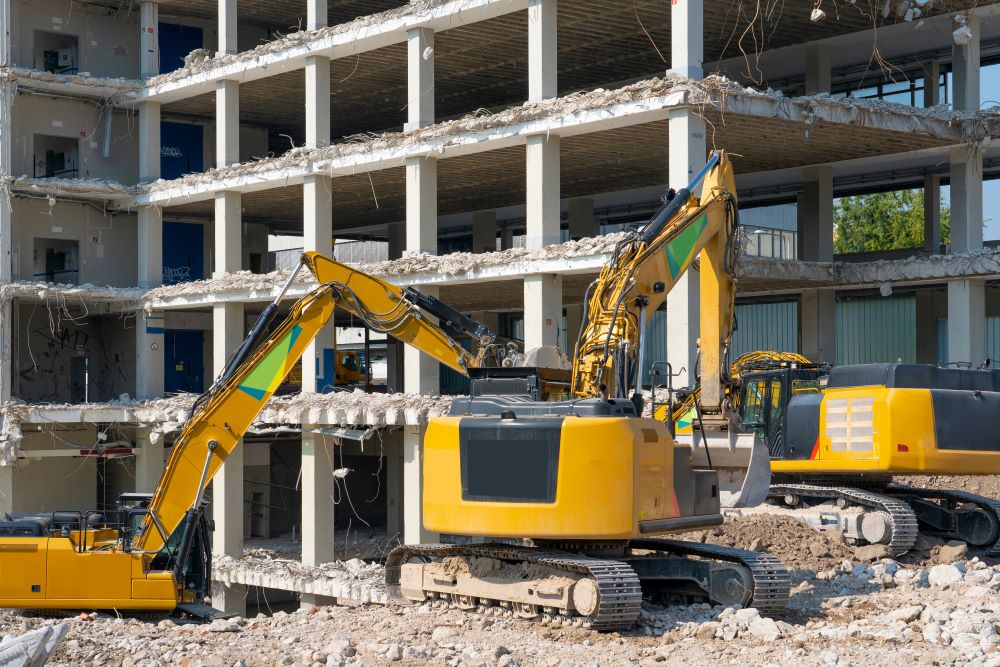
How Industrial Demolition Company Create Business Opportunity
Are you prepared to investigate the field of industrial demolition and find the many business prospects that lie ahead? Businesses that specialize in industrial demolition are leading the way in changing the construction industry and opening doors for successful projects.
With their state-of-the-art machinery and specialist knowledge, these businesses are changing the face of the industry.
OUR SERVICES
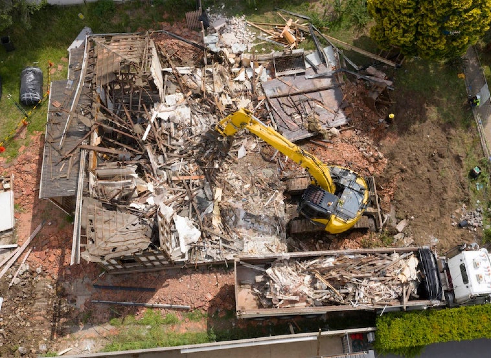
Structure Demolition. Residential, Commercial & Industrial
If your structure poses a health, safety, or environmental risk, demolition can prevent costly citations or fatal accidents. While this may seem daunting, you are just a phone call away from having your residential demolition done professionally, responsibly, and at a great price.
Talk to a Demolition Specialist Now! 916.249.5001
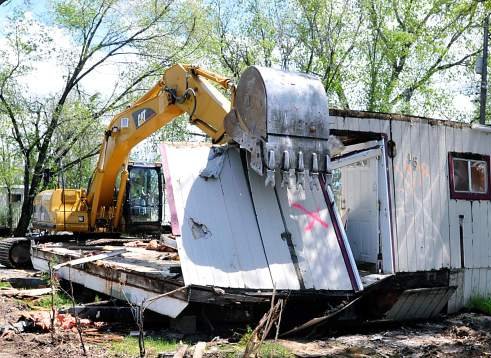
Mobile Home Demolition
We demolish and haul away mobile homes. Any size, anywhere, anyhow. We are fast, clean and competitive. We serve most of Northern California. There are many factors to consider when removing or demolishing your old trailer, mobile home, or manufactured home like: the processes involved, costs, time, contractors, debris, and permits.
Talk to a Demolition Specialist Now! 916.249.5001
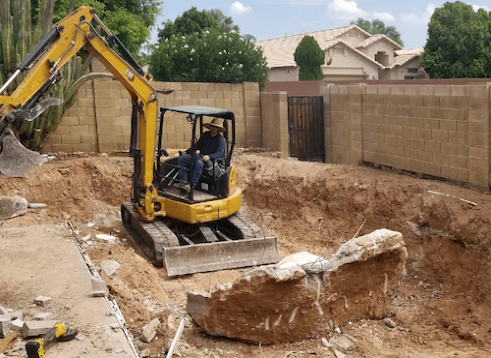
Pool Demolition
When removing a pool in Sacramento, California with the professional demolition team of Maxton Demo, you’re guaranteed peace of mind from beginning to end. From your initial request for an estimate to clean-up, you can expect our pool demolition process that’s completely professional and safe.
Talk to a Demolition Specialist Now! 916.249.5001
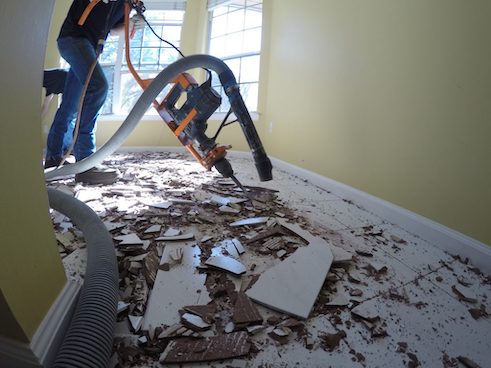
Floor Demolition
Flooring demolition, like any other major home renovation work, requires a specific set of skills and tools to be performed properly. You need experts in flooring demolition to get you the best floors possible. Contact us to find out more about how we can help you today.
Talk to a Demolition Specialist Now! 916.249.5001
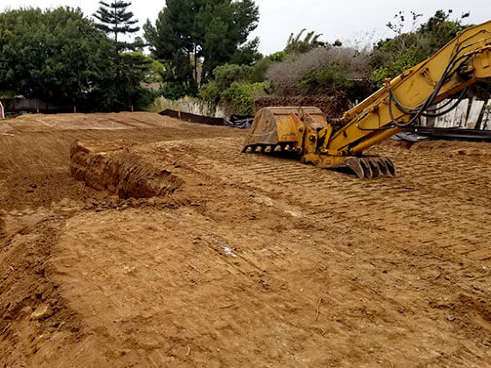
Grading & Excavating
If you need an experienced excavator and grader in Sacramento, call us today. One of the many reasons that residential, commercial, and industrial customers choose to work with us is because we’re able to provide a broad range of services to help construction-related projects get done in less time and at a reduced cost.
Talk to a Demolition Specialist Now! 916.249.5001

Roof Snow Removal
Heavy snow & ice dams can cause significant roof and home damage. Roof Snow removal is our specialty during the winter months. Serving the Sacramento, California area for 10 years, we can get your roof snow removed and promise a quick response and reasonable rates.
Talk to a Demolition Specialist Now! 916.249.5001
Industrial Demolition’s Significance for Business Opportunities
Industrial demolition is essential to the creation of commercial possibilities since it makes way for new construction. These businesses demolish old buildings to provide room for advancement and open doors for new initiatives. The market is full of opportunities as historic structures are transformed into contemporary facilities, demonstrating the revolutionary potential of industrial destruction.
Modern machinery and a variety of approaches are used in industrial demolition to quickly and effectively demolish buildings. Every technique, from selective dismantling to controlled implosions, is carefully selected to guarantee accuracy and safety. The use of sophisticated technologies and specialized equipment highlights the experience that these businesses provide and creates the conditions for a smooth project completion process.
An industrial demolition project’s planning stage is critical, requiring painstaking attention to detail and a comprehensive study of several elements. To guarantee the project’s success, factors including structural soundness, environmental effects, and regulatory compliance must be carefully assessed. Industrial demolition businesses may optimize their commercial potential from each project by using excellent strategic planning.
Equipment and Demolition Techniques for Industrial Demolition
A wide variety of methods are used in industrial demolition, each one specifically designed to meet the needs of a given project. Among the often-used techniques to guarantee accurate and effective structural disposal are controlled demolition, explosive demolition, and deconstruction. When combined with state-of-the-art equipment like hydraulic shears and high-reach excavators, these methods allow industrial demolition firms to complete projects with unmatched precision.
The technique of explosive demolition, which is often used for large-scale construction, entails carefully setting explosives to quickly and securely bring down buildings. Conversely, controlled demolition employs large machines and equipment to dismantle buildings floor by floor. A more complex method called deconstruction involves taking down buildings in order to recover important components that may be recycled or used again, in line with environmental objectives.
Industrial demolition equipment includes anything from excavators fitted with demolition attachments to specialty cutting instruments designed to work with different kinds of materials. Because they can reach great heights, high-reach excavators are perfect for tearing down towering buildings. Concrete and steel are broken down using hydraulic shears and crushers, which makes material sorting and recycling more effective.
Things to Take into Account While Arranging an Industrial Demolition Project
To assure success and reduce risks, industrial demolition project planning requires a thorough evaluation of several variables. Among the most important factors that need to be taken into account during the planning stage are structural stability, environmental effects, site circumstances, and regulatory compliance. Through comprehensive site inspections and risk analyses, industrial demolition firms are able to create designs that maximize both efficiency and safety.
To ascertain the building’s structural integrity and pinpoint any possible risks that could develop during the demolition process, a structural stability evaluation is crucial. When determining a building’s stability and creating a demolition plan, elements including the building’s age, construction materials, and prior alterations are vital considerations.
In order to reduce the environmental imprint and examine the possible consequences of demolition operations on the nearby ecology, environmental impact studies are carried out.
To efficiently design the logistics of the demolition project, it is important to thoroughly examine the site characteristics, including utilities, nearby buildings, and access points. Determining the project’s viability and identifying any possible difficulties that can occur during implementation require an understanding of the geography, soil composition, and existing infrastructure of the site.
Regulatory compliance helps to minimize legal risks and maintain a smooth project timetable by ensuring that the demolition project complies with building rules, local laws, and safety standards.
Environmental Factors in the Demolition of Industrial Structures
Industrial demolition businesses’ methods are heavily influenced by environmental factors, with an increasing focus on eco-friendly demolition processes and sustainability. Reusing and recycling resources like steel, wood, and concrete is essential to reducing waste and lessening the negative effects of demolition on the environment.
Industrial demolition businesses lessen the need for virgin resources and support a circular economy by repurposing materials for use in new projects.
Sorting, recycling, and disposing of demolition debris properly are all part of waste management techniques that help reduce pollution in the environment and optimize resource recovery. By putting into practice effective waste management techniques, valuable materials are preserved for later use, and the quantity of garbage that is dumped in landfills is decreased.
Reusing building materials for future construction projects and preserving architectural features for historical preservation are two sustainable practices that industrial demolition businesses are embracing more and more.
In order to handle any toxins existing on the site, industrial demolition operations often include environmental remediation measures. Common procedures to reduce environmental dangers and guarantee worker and community safety include asbestos abatement, soil remediation, and hazardous waste disposal.
Industrial demolition businesses show their dedication to sustainability and responsible environmental management by incorporating environmental issues into their operations.
Safety’s Function in Industrial Demolition
Industrial demolition places a high priority on safety, and strict policies and procedures are in place to protect the public’s and workers’ health. Putting safety first not only protects people and property but also increases project productivity and reduces downtime. Strict safety regulations and rules are followed by industrial demolition firms in order to reduce hazards and stop accidents during the demolition process.
For every demolition job, thorough safety plans are created that include protocols for identifying potential hazards, responding to emergencies, and providing crew training. In order to detect possible risks, such as unstable buildings, hazardous materials, and environmental hazards, and to apply measures to minimize these risks, site-specific safety assessments are carried out.
Industrial demolition businesses provide a safe work environment where people get continuous training and safety problems are addressed proactively, prioritizing the well-being of all parties concerned.
Protecting workers from possible risks found on demolition sites requires the use of safety equipment, such as respiratory protection, fall protection systems, and personal protective gear. To make sure that safety procedures are followed and to find areas for improvement, regular safety audits and inspections are carried out.
Industrial demolition businesses maintain their commitment to preserving the health and safety of their employees and society at large by promoting a culture of safety and continual development.
How Industrial Demolition Businesses Can Form Alliances and Cooperations
Partnerships and collaborations are essential to industrial demolition firms’ ability to develop, innovate, and broaden their commercial horizons. Industrial demolition businesses may enter new markets and profit from developing industry trends by forming strategic collaborations with developers, architects, and construction firms.
Through collaborative endeavors, businesses may take advantage of more profitable business prospects by using their resources and experience to take on bigger, more difficult projects.
The effective disposal and recycling of demolition debris is made possible by strategic alliances with recycling facilities and waste management firms, ensuring sustainable practices and reducing environmental impact. Industrial demolition businesses may contribute to the circular economy and remove materials from landfills by forming tight partnerships with recycling companies.
Collaborative efforts aimed at recovering and repurposing materials for use in building projects bolster the ecological credentials of industrial demolition firms.
Furthermore, industrial demolition businesses may remain at the forefront of industry developments and best practices thanks to partnerships with academic institutions and research centers.
Participating in research projects and knowledge-sharing efforts may help organizations become more capable and provide customers with creative solutions. Industrial demolition businesses may establish themselves as leaders in their sector by establishing strong ties with thought leaders and industry stakeholders, which in turn promotes a culture of constant learning and progress.
Industrial Demolition’s Future and How It Will Affect Business Opportunities
The field of industrial demolition has a bright future ahead of it, as sustainable practices and technological breakthroughs change the face of the sector. The planning and execution of demolition projects are undergoing a revolution because of innovations like robotic demolition, 3D modeling, and drone imagery, which are improving accuracy and efficiency.
By streamlining project processes and cutting operating expenses, the integration of digital tools and automated systems creates new business prospects.
Industrial demolition will continue to be influenced by sustainability as more businesses embrace green construction guidelines and environmentally friendly procedures. As companies and governments place a greater priority on resource conservation and environmental stewardship, there is an increasing need for sustainable demolition solutions.
Industrial demolition businesses will be well-positioned to take advantage of new business prospects and satisfy changing customer expectations if they adopt sustainable methods and circular economy concepts.
By incorporating artificial intelligence and data analytics into industrial demolition procedures, businesses may maximize resource allocation, project scheduling, and risk control. Real-time monitoring systems and predictive analytics improve safety procedures and decision-making, guaranteeing project effectiveness and compliance.
Industrial demolition firms may generate new opportunities for development and innovation and strengthen their competitive advantage by using technology and data-driven insights.
Strategic Demolition: Optimizing Your Investment’s Return
Are you prepared to go into the realm of strategic destruction and uncover your property’s untapped potential? Strategic demolition is more than simply demolishing buildings; it involves meticulous planning at every stage to guarantee the highest possible return on your investment.
You may make a demolition job lucrative by knowing the important tactics and factors to take into account. Let’s examine the key elements of strategic demolition and its advantages for developers, investors, and property owners.
Comprehending Strategic Destruction
There is more to strategic demolition than just demolishing a structure. It entails a thorough strategy that considers a number of variables, including cost, safety, the influence on the environment, and the potential for future growth.
The optimum course of action must be determined by doing a complete investigation of the building before starting a demolition operation. You may create a strategic plan that optimizes efficiency and avoids risks by having a thorough grasp of the materials utilized, structural integrity, and any dangers.
Every demolition project is different and calls for a different strategy, from small residential buildings to massive industrial complexes. Strategic demolition is essential to reaching your objectives, whether you’re trying to rejuvenate an existing site or clear ground for future development. You can guarantee a successful and efficient demolition procedure by hiring knowledgeable specialists and making use of the appropriate equipment and methods.
Strategic demolition involves more than simply destroying; it also involves paving the way for expansion and advancement. You may create the conditions for future initiatives that will provide significant returns on your investment by thoroughly organizing every phase and taking the long-term effects into account. Every step of the demolition process, from recycling garbage to preserving precious materials, may improve your bottom line.
Planning is Crucial for Strategic Demolition Projects
Any strategic demolition operation that is effective must start with careful planning. It’s crucial to create a thorough strategy that specifies the goals, schedule, budget, and safety precautions before bringing out the wrecking ball. You can steer clear of expensive delays and make sure the project continues on schedule by defining specific objectives and creating a demolition process plan.
Having a comprehensive strategy allows you to anticipate problems and take action to reduce risks before they become more serious. You can resolve any issues and make sure that the transition from planning to execution goes well by carrying out a thorough site evaluation and interacting with stakeholders as soon as possible. A strategic demolition project cannot succeed unless all parties involved collaborate and communicate effectively with one another.
Planning entails not only the technical components but also getting required permissions, procuring insurance coverage, and organizing logistics. During the planning stage, you may expedite the demolition process and get the best outcomes by being proactive and organized. Recall that the cornerstone of a successful demolition job is a well-thought-out strategy.
Making the Most of Your Investment with Strategic Demolition
By making way for future growth, strategic demolition provides a special chance to optimize the return on your investment. Through meticulous planning of the demolition procedure and the recovery of precious materials, you may recover expenses and generate new income streams. Well-planned demolition may raise the value of your property considerably, regardless of your plans for the land—you could even decide to rebuild on the spot.
A crucial approach to optimizing return on investment is collaborating with seasoned experts who comprehend the nuances of strategic demolition. A successful job may be ensured by collaborating with a trustworthy demolition contractor and making use of their resources and skills. Experts can assist you in reaching your objectives quickly and affordably, from carrying out a thorough site survey to putting safe demolition procedures into place.
Utilizing cutting-edge instruments and methods in addition to working with experts may improve the demolition process’s effectiveness and safety. Cutting-edge tools like building information modeling (BIM) software, robotic demolition equipment, and drones may simplify processes and lower hazards. Keeping up with the newest advancements in demolition technology can help you remain ahead of the competition and maximize the results of your projects.
Selecting a skilled and methodical strategic demolition contractor
Working with a qualified demolition contractor is crucial to carrying out a planned demolition job successfully. Demolition specialists ensure that the project is finished safely, effectively, and within budget by bringing a wealth of expertise, specialized knowledge, and state-of-the-art equipment to the table. Finding the ideal contractor for your unique requirements requires careful consideration and screening before choosing one.
Reputable demolition contractors should be legally and safely operating with the licenses, certificates, and insurance that they need. You may be certain of their capacity to provide outcomes of the highest caliber by confirming their qualifications and performance history. It’s also a good idea to ask for references and portfolio items in order to evaluate the contractor’s prior work and degree of customer satisfaction.
When collaborating with a demolition contractor, communication is essential. Throughout the project, having an open and honest communication channel helps to avoid miscommunication, delays, and cost overruns. Making clear expectations, deadlines, and milestones up front may help to guarantee that everyone is on the same page about the project’s objectives and deliverables. You and your contractor may work together to successfully negotiate the challenges of strategic demolition.
Affordability Issues in Strategic Demolition
An important consideration when organizing a strategic demolition operation is cost. Even though demolition may be a significant expenditure, expenses can be minimized and profits can be increased with careful planning and effective implementation. Comprehending the main cost aspects and variables that impact price is vital for financial forecasting and budgetary planning.
The technique of demolition selected for the project is one of the main factors affecting costs in strategic demolition. The prices of various methods, including high-reach excavators, mechanical demolition, human deconstruction, and implosion, vary according to their complexity and resource requirements. You may reduce costs and get more value by choosing the most economical approach that fits the project objectives.
Aside from the techniques of demolition, other expenses include personnel, permits, garbage disposal, equipment rental, and site preparation. You may find chances for cost reductions and efficiency gains by getting quotations from many reliable contractors and doing a careful cost analysis. A realistic budget and backup plan should be set up in order to cover unanticipated costs and modifications that may arise throughout the demolition process.
The Role of the Environment in Strategic Demolition
One crucial component of strategic demolition that cannot be disregarded is environmental sustainability. Waste, pollutants, and other environmental effects from demolition operations have the potential to negatively affect ecosystems and public health.
As an example of your dedication to responsible development, you may reduce the demolition project’s environmental impact by using eco-friendly procedures and following rules.
Waste management is one of the most important environmental factors in strategic demolition. Reusing and recycling materials like metal, wood, and concrete may help you keep trash out of landfills and lower the need for new resources. Salvaging precious resources helps achieve sustainability and cost-saving objectives, in addition to being good for the environment.
Controlling the quality of the air while demolition is underway is another critical factor. If not appropriately handled, dust, particulate matter, and airborne contaminants may endanger the health of both employees and the general public.
Utilizing ventilation systems, safety gear, and dust suppression approaches, you can lessen air quality problems and guarantee a secure working atmosphere. Reducing the effect of demolition on air quality requires environmental monitoring and regulatory compliance.
The Prospects of Strategic Demolition and Their Effect on the Building Sector
It’s obvious that strategic demolition will keep being a vital technique that shapes the building sector as we look to the future. A strategy to accomplish development objectives while reducing environmental effects is via strategic demolition, which is in line with the increasing focus on sustainability, efficiency, and innovation. The sector may seize new chances for expansion and advancement by embracing cooperation, using technology, and implementing best practices.
Strategic demolition has an effect that goes beyond just clearing land; it creates the conditions for fresh starts and revolutionary initiatives that improve communities and boost the economy. A more resilient and sustainable built environment may be created for future generations by stakeholders if they engage in responsible practices and understand the need for strategic demolition.
For years to come, strategic demolition will be a major factor in determining how the building industry is shaped as we face the possibilities and challenges that lie ahead.
Do you have a Question?
Talk to a Demolition Specialist Now! 916.249.5001
Request Formal Quote